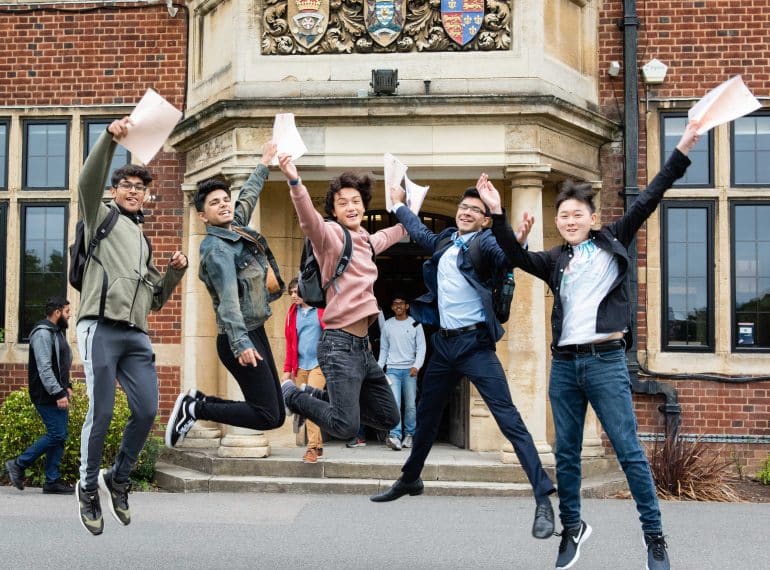Headmaster’s update

This term began with Queen Elizabeth’s School still in celebratory mood following our superlative results at both GCSE and A-level.
 New records were set in August, with the number of GCSE examinations awarded the A* grade hitting 78%. At A-level, we recorded our highest-ever total of A* grades, while 2018 was the 13th consecutive year in which the proportion of examinations awarded A*–B grades – a commonly used benchmark figure – has topped 95%.
New records were set in August, with the number of GCSE examinations awarded the A* grade hitting 78%. At A-level, we recorded our highest-ever total of A* grades, while 2018 was the 13th consecutive year in which the proportion of examinations awarded A*–B grades – a commonly used benchmark figure – has topped 95%.
Since then, external sources have further confirmed and corroborated our success. First came a Government league table showing that QE is the top selective school in England when measured against the Department for Education’s Progress 8 figure, which records progress between the end of Key Stage 2 (the last year of primary school) and GCSE results in Year 11. Our Progress 8 figure of 1.22 placed us ahead of any other grammar school and 15th out of the 6,530 schools and colleges measured. Furthermore, the School comfortably outperformed all 14 schools above it when compared against two other Government measures, Attainment 8 and the English Baccalaureate (EBacc), both of which are methods of recording pupils’ achievement in key GCSE subjects.
That was followed by evidence of the School’s success in providing high-calibre careers education emerging in a national survey conducted by recruitment consultancy Rare. This found that more boys from QE apply to graduate recruitment programmes run by blue-chip law, finance and management firms than from any other state boys’ school.
 More recently still, QE was crowned the country’s top state school in the Sunday Times Parent Power survey, overtaking the 2017 winners, The Henrietta Barnett School, to head the table comprising the 150 leading state schools. This highly influential survey determines ranking based on the percentage of examination entries gaining A* to B grades at A-level (which is given double weighting) and the percentage of entries awarded A* and A grades at GCSE.
More recently still, QE was crowned the country’s top state school in the Sunday Times Parent Power survey, overtaking the 2017 winners, The Henrietta Barnett School, to head the table comprising the 150 leading state schools. This highly influential survey determines ranking based on the percentage of examination entries gaining A* to B grades at A-level (which is given double weighting) and the percentage of entries awarded A* and A grades at GCSE.
QE may perhaps with some justification now lay claim to being considered the UK’s leading state school. Precisely because of that, it is important that our horizons as a school are broad and expansive, and that we encourage, train and nurture our pupils so that they can excel in our increasingly interconnected world. This term’s commemoration of the centenary of the 1918 Armistice stands, among other things, as a warning, a sobering reminder of the potentially disastrous consequences of narrow nationalism. And whatever the outcome of the current turbulent period surrounding Brexit, Britain’s future leaders in society, commerce and academia will need to be equipped to thrive both in Europe and beyond.
Major employers frequently lament the dearth of readily employable graduates who are globally-minded, cross-culturally competent, and, preferably, able to speak another language other than English. To gain such a global perspective, boys need to acquire ‘soft skills’ such as open-mindedness, the ability to listen carefully to others, interest in other cultures, adaptability and curiosity. All of these attributes are in fact adumbrated in aspects of our mission, which, for example, enjoins the School to encourage “independence of thought” and to focus “the boys’ attention on their own development and aspirations, both at the School and beyond”.
 It is tremendously important that boys develop and maintain a broad outlook alongside their achievement of very strong academic results if they are to thrive. One foundation of such a holistic approach is that boys begin reflecting upon their own lives and attitudes as they start finding their place in the world. Two of our alumni, poet Anthony Anaxagorou (OE 1994–1999) and Bilal Harry Khan (OE 2003–2010, featured elsewhere in this newsletter) explored the sometimes-tricky areas of identity, masculinity and gender roles when they visited this term, with Bilal speaking to Year 11 and Anthony delivering a Sixth Form assembly. Alongside and related to these areas, we recognise the importance of boys looking outwards in their relationships, adopting habits of kindness, thoughtfulness and respect for others. By so doing, not only do boys establish better relationships, but they also stand to gain themselves.
It is tremendously important that boys develop and maintain a broad outlook alongside their achievement of very strong academic results if they are to thrive. One foundation of such a holistic approach is that boys begin reflecting upon their own lives and attitudes as they start finding their place in the world. Two of our alumni, poet Anthony Anaxagorou (OE 1994–1999) and Bilal Harry Khan (OE 2003–2010, featured elsewhere in this newsletter) explored the sometimes-tricky areas of identity, masculinity and gender roles when they visited this term, with Bilal speaking to Year 11 and Anthony delivering a Sixth Form assembly. Alongside and related to these areas, we recognise the importance of boys looking outwards in their relationships, adopting habits of kindness, thoughtfulness and respect for others. By so doing, not only do boys establish better relationships, but they also stand to gain themselves.
For those seeking to learn how to operate effectively in a global environment, it is important, too, that their relationships include some with people from other walks of life and from other cultures. There are frequent opportunities for boys to broaden their horizons through purposeful international travel. Whether these are sports tours or subject-related trips organised by academic departments, such visits always deepen intercultural understanding.
For our senior boys, we are encouraging the increasing aspiration of many to study abroad. A sizeable group of our Year 12 boys have been working this term with our visiting interns from the University of Connecticut and others as they prepare to submit applications to US universities. Visits from recent leavers, such as Valavan Ananthakumaraswamy (OE 2009-2016), the first QE boy ever to be offered a place at Stanford University, provide further inspiration.
I wish all our alumni a Merry Christmas and a peaceful and prosperous New Year.
Neil Enright
